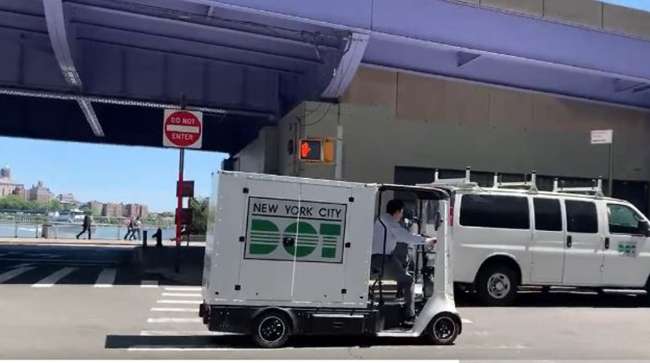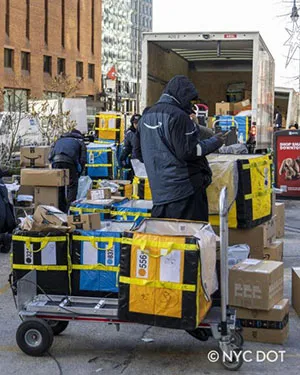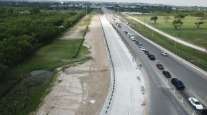Staff Reporter
New York City to Test Microhub Final Dropoffs

[Stay on top of transportation news: Get TTNews in your inbox.]
New York City officials will experiment this summer on a new system using delivery trucks to drop goods at special off-street or curbside microhubs for handovers to cargo bikes and hand carts for final drop-offs.
Objectives of the two-part Microhubs Pilot are to lower truck emissions, improve safety and “rethink the city’s curb space to meet the demands of e-commerce.”
The pilot focuses on the last part of the logistics process in moving goods from a local distribution point to a final receiver. Instead of relying on trucks, last-mile delivery vehicles will include hand carts, bicycles/e-bicycles/bicycles with trailers, cargo bikes and electric vans.
“Local delivery hubs offer promising potential to reduce the number of large trucks on local streets by providing safe spaces for truck operators to transfer deliveries onto more sustainable modes of transportation,” according to the New York City Department of Transportation.
Polls are closed in the @nyc_Dot's "Name our Cargo Bike" vote — but you can still read all about the agency's innovative "Cargi B" in our story: https://t.co/XV8qjDBEq2 — Streetsblog New York (@StreetsblogNYC) May 30, 2023
Thousands of loading zones have been installed in the city’s five boroughs to create dedicated spaces for truck deliveries.
Up to 20 local delivery hub sites will test curbside and off-street hubs. Microhub sites will be chosen based on considerations such as closeness to truck routes, bike lane networks and high-density areas with mixed land use.
Work on the project has continued without major public developments since it was unveiled in April by Ydanis Rodriguez, NYC DOT commissioner.

Packages are processed at a microhub. (New York City Department of Transportation)
“New Yorkers are receiving more deliveries than ever before, and we are pursuing creative ways to make these deliveries cleaner, safer and more efficient by reducing the number of delivery trucks on our roads,” Rodriguez said at that time. “These hubs will help better organize last-mile deliveries and support small and large businesses’ economic recovery as we emerge from the pandemic.”
“This overreliance on trucks exacerbates traffic congestion, contributes to public safety challenges on our roadways, pollutes our air, stresses our aging infrastructure and negatively impacts quality of life,” NYC DOT stated.
During the first phase, NYC DOT will monitor hub operations, collect data and make adjustments “to ensure there is equitable implementation and enforcement for both small and large companies.”
Did You Know?
• Trucks deliver nearly 90% of New York City’s goods.
• More than 80% of New York residents have received at least one package since the pandemic began.
• 18% receive packages on four or more days at home per week.
• Before the pandemic, residential customers only received 40% of deliveries, while 60% were commercial deliveries.
Source: New York City Department of Transportation
Starting next fall to 2026, the second phase will add more local delivery hubs and delivery partners, identify regulatory changes and incentives and review new technology/amenities to develop a permanent local delivery hub system.
NYC DOT planners also will evaluate lessons learned from the project. A survey in its April report on Microhubs revealed numerous concerns from stakeholders such as limited bathroom access for workers, insufficient dedicated parking and inadequate charging stations for electric vehicles.
Other concerns included conflicts with street and sidewalk users, state 36-inch limits on cargo-bike widths (most commercial ones are 48 inches) and a lack of information about zoning restrictions for repurposing garages and retail buildings for loading zones.
NYC DOT noted that similar projects have tested the concept within the past five years in a few places in the United States (Washington, D.C.’s CurbFlow, Philadelphia’s Smart Loading Zones and Seattle’s Microhub) as well as overseas in Berlin, London and Paris (in the city and at the Port de la Bourdonnais).
Want more news? Listen to today's daily briefing below or go here for more info:




